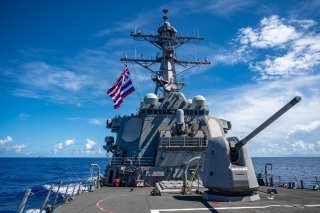Meet the DDG Next: A Smaller, But Heavily Armed Naval Destroyer?
Now the Navy is reportedly taking another look at the Arleigh Burke-class for guidance as it begins the development of a “next-generation destroyer.”
Here's What You Need to Remember: According to the Navy’s 2020 thirty-year shipbuilding plan, the service would start to acquire new vessels beginning in 2025, but it could take a while to get such a ship designed, and it is unlikely the DDG Next would be able to meet the time constraints.
The U.S. Navy’s Arleigh Burke-class of guided missile destroyers was developed during the Reagan era and first entered service when President George H. W. Bush was in office. It has had the longest production run of any post–World War II U.S. Navy surface combatant. To date sixty-eight out of a planned eighty-nine have entered service, and the with the decommissioning of the last Spruance-class destroyer in 2006, the Alreigh Burke-class was the sole active U.S. Navy destroyer until the Zumwalt-class was commissioned in 2016.
Now the Navy is reportedly taking another look at the Arleigh Burke-class for guidance as it begins the development of a “next-generation destroyer.” Last week while speaking at the Defense One’s State of the Navy event, Adm. Michael Gilday said that the Navy’s future destroyer—dubbed DDG Next—would likely be smaller than the Zumwalt-class but would be more heavily armed with a larger missile magazine than the Arleigh Burke-class.
“When you talk about large surface combatants, people in their mind’s eye, they’re thinking battleship,” Gilday was quoted of telling the virtual audience at the Defense One event.
“That’s not where we’re going. We’re talking about a ship that’s going to be probably smaller than a Zumwalt, right? I don’t want to build a monstrosity,” Gilday added. “But I need deeper magazines on a manned ship, deeper than we have right now.”
Not Too Big, Not Too Small
The Cold War era Arleigh Burke-class of warships have an overall length of 500 to 510 feet and a displacement that ranges from 8,230 to 9,700 tons—significantly smaller than the 610 feet and nearly 16,000-ton displacement of the USS Zumwalt (DDG-1000).
Gilday suggested that the DDG Next would be based on the DDG Flight IIIs, the most recently updated version of the Arleigh Burke-class, including its weapons capabilities. However, the Flight III variants are limited in terms of what can be added to the ships. The best option would be to use those systems but on a newly built platform.
“The idea is to come up with the next destroyer, and that would be a new hull,” said Gilday. “The idea would be to put existing technologies on that hull and update and modernize those capabilities over time.”
While many of the weapons could be from the Flight III variants, the DDG Next would also get a little bit of technology from the Zumwalt-class, notably its power generation capabilities, which could be used to sustain directed energy weapons that could make the warship and the wider U.S. Navy’s entire fleet far more survivable in a future conflict.
The Thirty Year Plan
According to the Navy’s 2020 thirty-year shipbuilding plan, the service would start to acquire new vessels beginning in 2025, but it could take a while to get such a ship designed, and it is unlikely the DDG Next would be able to meet the time constraints.
However, it seems that the Navy has a vision for a ship that could be just the right size, and more importantly which could be developed quickly using the technology of today while being upgradeable as new hardware comes online.
Peter Suciu is a Michigan-based writer who has contributed to more than four dozen magazines, newspapers and websites. He is the author of several books on military headgear including A Gallery of Military Headdress, which is available on Amazon.com. This article is being republished due to reader interest.
Image: Flickr.

